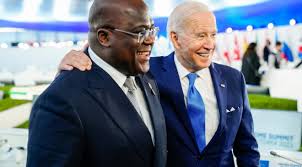The US-Africa summit has more to it than the lofty ideals about lifting the continent out of poverty, hunger, climate change, and other iniquities, observers say.
The biggest gathering in the US capital since the outbreak of COVID-19 saw the presence of 49 African leaders, including from the African Union (AU).
The three-day summit which started on Tuesday is also expected to discuss security, employment, trade and investment on the continent.
The US has pledged $55 billion to Africa in the next three years as part of efforts to implement the new US-Africa policies.
Moreover, America, under the administration of President Joe Biden, wants to build up trust with the continent.
The US National Security Adviser Jake Sullivan said at the summit that Africa has become very important geopolitical player that has the potential to help shape the future of world politics and economy.
However, some political analysts say the US is more concerned about the growing power and influence of China and Russia in a continent which has not shied away from doing business with these emerging world powers.
Many say the United States is desperately trying to play catch up at a time when the influence of the Chinese in Africa is unprecedented.
While Washington’s foreign policy had tended to shrink from the chance of opening up more and more to the continent, its influence has been on the wane thanks in large part to a parallel narrative about China’s mounting interest in Africa.
These contrasting stories are epitomized by the fact that Chinese investment in Africa has far outstripped that of the United States in the last decade.
The heavy Chinese presence in Africa could be seen and felt in the mammoth infrastructure projects that yield roads, railways, dams, bridges, schools, hospitals – costing hundreds of billions of dollars in serviceable loans.
Trade between Africa and the world’s second largest economy rose to a record high in 2021, increasing by 35 percent or $254 billion.
A resurgent Russia is also not too far behind China in its diplomatic offensive on the continent which like in the days of the Cold War is winning African hearts and minds thanks to its policy of non-interference in the internal affairs of countries.
The fact that more African countries are unwilling to criticize Moscow over the war in Ukraine points to a growing common understanding with Africa.
Keen not to be left out of this modern day scramble for Africa, Washington has been prompted to rethink its strategy on the continent.
Jake Sullivan said the new US-Africa polities are geared towards increasing African voices in international fora around the world issues such as “global economy, democracy and governance, climate change, health, and security.”
Africa has always tried to find a voice on the international stage, especially at the United Nations.
The continent has campaigned very hard for a permanent seat at the UN Security Council, something Sullivan said the US was going to support.
The COVID-19 global pandemic has exacerbated insecurity, poverty and inequality, especially when most economies in Africa have run out of capacity, resulting in high inflation, low productivity, weak currency and high interest rates.
The continent has been promoting intra-Africa trade to boost their economies and minimize the cost and impact of shocks such as COVID-19.
Last week, eight African countries, Ghana, Kenya, Rwanda, Tanzania, Egypt, Mauritius, Cameroon and Tunisia agreed to start trading under the African Continental Free Trade Area (AfCFTA), a project expected to lift millions of Africans out of poverty.
Any new US-Africa strategy will have to consider helping this iniative to flourish and sustain intra-African trade.
ABJ/APA


